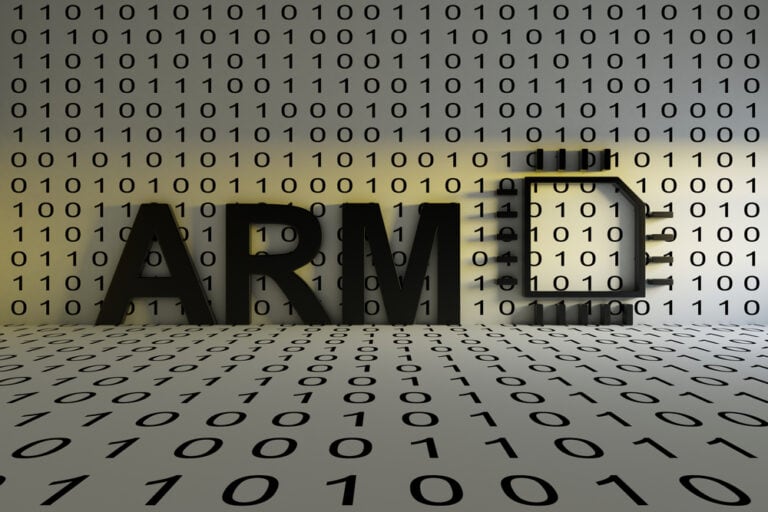Japan’s Softbank acquired Arm in 2016 for $32 billion (€28.9 billion at the time). After being forced to call off a sale to Nvidia, it now opts to list the British chip designer on the Nasdaq. With the IPO set to take place Wednesday, it seems Softbank’s adjusted expectations are also still too high. What is Arm actually worth?
Arm’s architecture is used by virtually all modern smartphones, from premium iPhones to budget Android devices. Unfortunately for Softbank and Arm, that particular market is undergoing a period of declining demand: consumers are increasingly putting off buying a new device. Phones are currently only theoretically faster each generation, with benchmarks claiming big improvements but day-to-day usage remaining largely the same experientially. That sag in the smartphone market is hitting Arm’s revenue stream significantly, as it licenses its patented designs to smartphone manufacturers. These royalties have been the foundation of Arm’s successful revenue model for years.
Tip: ‘Arm shares to start at $47 to $51, most valuable IPO in years’
Switzerland model
Arm is in a unique position within the tech industry. It is repeatedly compared to Switzerland because it deals with virtually every company while maintaining its apparent neutrality. While AMD and Intel compete with each other with x86 chips, only Arm holds the patents for its own architecture. It itself does not make processors at scale, even though there are deals with Intel to possibly change that. Therefore, the originally British company is not currently a threat to Samsung, Apple and others.
That seemed to change as early as 2020. Nvidia knocked on Softbank’s door with a $40 billion offer. At the time, Nvidia CEO Jensen Huang was hopeful about future integration. The goal: to conquer the world with AI. “In the future, trillions of computers running AI will create a new internet-of-things thousands of times larger than today’s internet-of-people,” he claimed. Competition authorities prevented the acquisition in 2022. Meanwhile, Nvidia has managed to turn this year’s AI hype into a gigantic increase in market cap, even without having Arm as part of the company. For example, It uses Arm architecture in the AI-focused GH200 Superchip, so it is still essential to the GPU giant’s hopes.
Big ambitions, difficult circumstances
So Softbank suddenly had to come up with other plans for Arm in early 2022. The scuttling of the Nvidia deal led to a substantial round of layoffs. However, the chip designer has since provided more clarity on what it plans to achieve in the future. Datacenters and AI, alongside smartphones and other mobile devices, are becoming crucial to its longer-term strategy. With these ambitions, it hopes to lure investors. In any case, it can count on a veritable longlist of cornerstone investors, or investors who required to buy a hefty portion of the available shares at the IPO. These include Apple, Alphabet, Nvidia, AMD, Intel and Samsung. Reuters reports today that Softbank does not plan to make more than 9.4 percent available. Arm’s market cap at its IPO is expected to be $54.5 billion, or 50.8 billion euros.
Softbank recently tried to drive Arm’s value when it bought up 25 percent of shares in the chip company from its own Vision Fund. Its sale price suggested that Arm would be worth $64 billion (59.7 billion euros). It seemed like a well-timed ploy to provide some extra appeal for Arm shares. However, Financial Times suggested that investors were better off ignoring it. It suggested that Arm’s real value is closer to $30 billion (€27.9 billion).
In other words: Softbank may well end up being a little disappointed. Arm will have to ride on Nvidia’s sales prowess to take full advantage of the AI hype sooner. Earlier this year, the GPU vendor claimed that datacenters must be shaken up as generative AI looks set to transform the industry at high speed. In other words, Arm’s ambitions are still inextricably linked to Nvidia, even now that the acquisition is off the table. Also, the potential AI ambitions of Apple and other smartphone makers may cause Arm to rise in value. After all, Qualcomm suggested a few months ago that several small local Arm processors should be able to run AI workloads. Ultimately, a positive trend in the smartphone world would also provide improvement, AI-powered or not.
All this is more problematic than it seems: it’s largely dependent on the promise of the future, however: Arm enters the stock market this week. It has a good chance to benefit long-term from the AI revolution, but in the here and now, the IPO market isn’t setting the world alight. Interest rate hikes have contributed to investor caution when dealing with tech stocks, among other things. The Arm IPO faces a tumultuous market where money doesn’t just come flooding in, even though the company will likely be the most valuable addition to the Nasdaq this year. It is not ideal in the short term, so Softbank will not want to get rid of the 90.6 percent of its own shares too soon.
